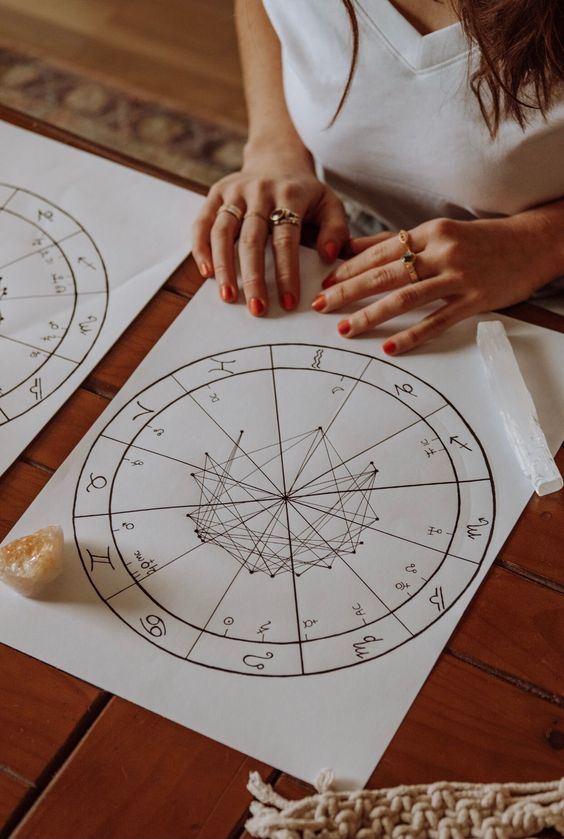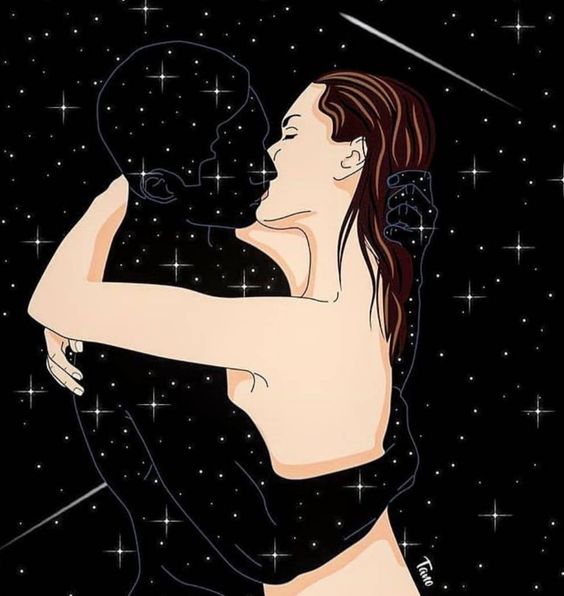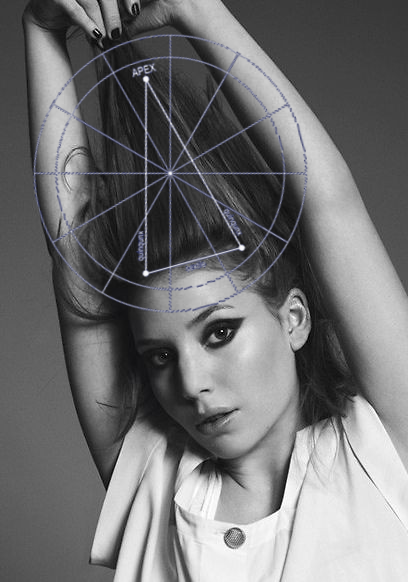
Neptune Transits the 7th: The Sea of Relating
 The 7th house is the realm of one-to-one relationships—marriage, partnership, legal entanglements. When Neptune transits, you may feel betrayed. Used, even. But Neptune not only reveals them, it reveals you—your projections, your dreams projected onto the flesh of another, your longing not to be loved, but to be rescued. Now, Neptune can feel rather lovely in the beginning. There’s a sense of magic in the air. You look at your partner—or the idea of a partner—and see some transcendent ideal, a soulmate, a twin flame, a spiritual muse sent to complete the geometry of your soul. You are lit by the halogen glow of holy fantasy. But then, slowly, maddeningly, it begins. The drift. The dissolve. What once seemed divine now seems a bit… off. Words don’t land the same. Their eyes, once pools of eternal promise, now look distracted, maybe even disinterested. And you? You’re left wondering if you were ever really in love with them, or with the story you painted over their silhouette.
The 7th house is the realm of one-to-one relationships—marriage, partnership, legal entanglements. When Neptune transits, you may feel betrayed. Used, even. But Neptune not only reveals them, it reveals you—your projections, your dreams projected onto the flesh of another, your longing not to be loved, but to be rescued. Now, Neptune can feel rather lovely in the beginning. There’s a sense of magic in the air. You look at your partner—or the idea of a partner—and see some transcendent ideal, a soulmate, a twin flame, a spiritual muse sent to complete the geometry of your soul. You are lit by the halogen glow of holy fantasy. But then, slowly, maddeningly, it begins. The drift. The dissolve. What once seemed divine now seems a bit… off. Words don’t land the same. Their eyes, once pools of eternal promise, now look distracted, maybe even disinterested. And you? You’re left wondering if you were ever really in love with them, or with the story you painted over their silhouette.
This is the unravelling that Neptune—especially when configured in hard aspect. You’re being drawn into the bewildering truth of relationship: that we often enter them not with clear vision, but then recreate them using images borrowed from childhood longings, unmet needs, and maybe even from the hungry ghosts of past lives. Under Neptune’s influence, deception isn’t always malevolent. Sometimes it’s mutual. A tacit agreement to play roles, to maintain illusions because the reality is often so plain, so unromantic, so painfully real. And when those illusions start to rot at the edges, it feels like betrayal. But it’s not betrayal of the heart. It’s betrayal of the fantasy. And that betrayal is necessary, even holy.
So you begin to see them for who they are—maybe less glittering. And in the starkness of that view, you may also glimpse yourself, stripped of longing, bare of fantasy. It hurts. It aches. But it’s the ache of awakening. It’s what happens when your love life stops being a dreamscape and starts being a mirror. You may lose someone during this transit. Or you may simply lose the idea of them. But what you gain, if you stay with the pain, if you let it teach you rather than drown you, is a deeper love. One not based on projection, but presence. Not on rescue, but recognition. Let the illusions fall. Let the fog clear. Let your heart break open. And in the quiet aftermath, when the fantasy have faded, you may hear the gentle voice of something real.
At first Neptune’s transit through the 7th house is exquisite—otherworldly, even. There’s this magnetic pull, a sense that you’ve found the one who finally understands the lyricism of your soul. Their presence completes you—at least, that’s how it feels. You dissolve into he relationship. Boundaries blur. Identities intertwine. You’re no longer two people; you’re one ecstatic being caught in the glow of mutual adoration. But Neptune doesn’t do stability. Neptune does transcendence, illusion, and, when it’s feeling particularly instructive, heartbreak that leads to spiritual rebirth.
So, what began as divine union soon starts to bend, crack, and, ultimately, unspool. The spell lifts. The light changes. And suddenly the beloved doesn’t look quite so heavenly. The silences between you, once filled with meaning, now feel ominous and hollow. It’s as though you’ve been in love with a ghost—and the ghost is beginning to fade. This merging of identities is not inherently wrong—it can be healing, even euphoric. But it comes with a price: the erosion of the self. You may look in the mirror one morning and realize you don’t quite recognize who’s staring back. Not because they’ve changed—but because you’ve been wearing someone else’s dream on your face.
It’s tempting, during this transit, to blame the other person—to call them deceptive, manipulative, emotionally unavailable. And sometimes, yes, they are. But more often, Neptune teaches us through reflections. The illusions we suffer in love are usually the illusions we invited in—unconsciously, to protect us from the loneliness reality. We project what we hope to receive, and then we suffer when reality doesn’t uphold the fantasy.
But there’s a strange mercy in this disillusionment. When the deception lifts, it hurts—but it also liberates. You’re no longer bound to the image. You’re free to engage with the real—both in your partner and in yourself. The love that survives this unraveling is clearer, kinder, more conscious. And if the love does not survive, then what ends is not love, but a lie.
Is it they who spun the golden lies? Or was it you, fashioning fantasy from fragments, desperately hoping they would hold? This is Neptune’s real magic trick—the slow, excruciating revelation that we were complicit in our own enchantment. Because to believe in the dream is to be safe, to be loved, to be chosen. Until the dream becomes too heavy to sustain, and it begins to unravel. And then comes the ache. The heartbreak of losing the story—the myth you wrote together, or more often, alone. The narrative where they were your savior, your missing piece, your proof that you were worthy of divine love. When that illusion cracks, it’s existential grief.
Once the smoke clears—and it will, if you let it—you’re left with clarity. The bittersweet truth of who you are without the fantasy. And that is the real offering of Neptune in the 7th: a chance to meet yourself unadorned. To see your projections, your patterns, your hunger for transcendence in human form. You may never look at love the same way again. But that’s the point. Because love, true love—the kind that endures—doesn’t demand perfection. It asks for presence. This is not a transit of endings, though many things may end. It is a transit of revealing. Of peeling back the gauze and learning to love in the light, rather than in the glow of fantasy. And in that raw light, you might just find something extraordinary—not the love you dreamed of, but the love that is.
To be caught in Neptune’s web is not to be foolish, but to be human. You see, Neptune doesn’t operate in the world of cause and effect, of reason and reward. Neptune speaks in symbols, not syllogisms. So when we try to apply our sharp little mental tools—logic, analysis, rational deduction—we find ourselves like a fish trying to measure the ocean with a ruler. It’s futile—it’s the wrong tool entirely. And so, when the dream collapses—when the figure before us loses their halo and stands simply, awkwardly, beautifully human—it can feel like betrayal. We mourn not only what we thought they were, but who we got to be in their light: the chosen one, the beloved, the person who finally felt whole.
You weren’t wrong to believe. You weren’t naïve to hope. You were being taught—not to stop dreaming, but to dream more wisely. To discern between fantasy that sedates and vision that illuminates. The self-blame you may now feel. The cruel voice that says, “You should’ve known,” should not be listened to. As if Neptune’s veils are made of glass instead of gauze. But love—especially Neptunian love—by its very nature, obscures. You didn’t fail. You participated in a lesson that no one escapes. Even the wise have wandered these waters and found themselves kneeling on the shores of reality, soaked and shaken.
There’s a certain grace, though, in surviving the spell. Once the illusions burn off, you begin to see with eyes less enchanted but more attuned. You learn not to close your heart, but to open it more bravely. Because now you know: love is not about losing yourself in someone else’s story—it’s about bringing your whole self to the page. So if you’re standing in the ruins of a fantasy, don’t rush to rebuild. Sit. Breathe. Let your heart catch up with the truth. And know this: Neptune didn’t come to punish you. It came to cleanse you. Of illusion, of projection, of every half-truth you once clung to. And what’s left, once the tide goes out, is a clearer sense of love. Not perfect. Not painless. But real.
This is why the Neptunian journey is not for the faint of heart. It requires the courage to lose your way, and the humility to know that sometimes, getting lost is the only way to truly arrive. You have to shift away from blame and toward empathy. It is the very medicine Neptune offers, if we’re willing to drink from its chalice. It’s a strange elixir, bitter at first sip, but rich with the flavor of transcendence. Because in the aftermath, once the fog lifts and we’re left blinking in the stark daylight of reality, we’re offered a chance: the chance to forgive. We can forgive the other person, but also the version of them we adored—and ourselves, too. For loving blindly. For needing so deeply. For hoping with such wild abandon.
There are no villains in the realm of dreams—only humans, fumbling toward love with whatever tools we’ve been handed.
The aching heart of the Neptunian experience is disillusionment. This isn’t petty disappointment, but the soul-deep unraveling of the stories we spun, believing—needing—them to be true. Disillusionment, in the Neptunian sense, is not a betrayal of logic, but a betrayal of longing. It is the quiet devastation of realizing that the love we believed in, the purpose we pursued, the reality we clung to, were all shimmering projections—refractions of unmet needs and beautiful lies.
It is grief. But not always grief for a person or a thing. Often, it’s grief for the version of ourselves who believed. Who dared to dream. Who held out hope like a child with an open hand. And in the wreckage of illusion, we do what humans do—we castigate ourselves. “How could I not have seen? How did I miss the signs? Why did I want it so badly that I ignored the truth bleeding at the edges?” But this—this—is the genius and cruelty of Neptune. It doesn’t deceive like a thief in the night. It seduces like a muse, drawing you into a world of meaning and myth where everything feels true, even when it isn’t. It’s not failure. It’s participation. It’s being human under the influence of a divine spell.
Neptune clouds your vision because you’re ready to see with more than just your eyes. It blinds you to the facts so you might feel the truth. And the truth, as you’ve now encountered, is that we don’t just fall in love with people—we fall in love with what they represent. Disillusionment is a form of spiritual detox. Painful, but necessary.
Even the most grounded, self-assured individuals—those who move through life with certainty and well-defined boundaries—can find themselves slowly unraveled under Neptune’s transit. When Neptune transits the 7th house, especially under angular, hard aspects—the conjunctions, squares, and oppositions—it doesn’t simply invite transformation. It insists on it. And often transformation comes through love, or at least the idea of it. Suddenly, the autonomous self begins to long for dissolution.
This is no ordinary romance. This is the archetypal pull toward unity. It feels holy. It feels destined. It speaks of soulmates, of karmic contracts, of connections that defy explanation but demand everything. And under this enchantment, even the most pragmatic among us may find themselves making choices they’d once scoffed at. Flying across continents. Forgiving betrayals. Abandoning plans, careers, even long-held truths, all in the name of this intoxicating entanglement.
What’s most disorienting is how right it feels in the moment. Neither impulsive or chaotic, but pure. Guided not by whim, but by something that feels bigger—almost divine. But when the Neptunian veil eventually lifts, what’s left behind can feel like a kind of emotional shipwreck. You look around and wonder: where did my sanity go? Where is the solid ground I used to stand on? The self may blur during this transit, but it doesn’t vanish. It evolves. This is not a mistake, nor a moral failure. It is a rite of passage. A dismantling of certainty, yes—but also a revealing of soul.



















 Venus Trine Pluto: Dark Desires
Venus Trine Pluto: Dark Desires
 Mars Conjunct Pluto Synastry
Mars Conjunct Pluto Synastry
 Sun Square Pluto Synastry: You’ve Got That Power Over Me
Sun Square Pluto Synastry: You’ve Got That Power Over Me
 Saturn in the 1st House: From Self-Doubt to Lasting Identity
Saturn in the 1st House: From Self-Doubt to Lasting Identity
 Venus Trine Mars Synastry
Venus Trine Mars Synastry
 The Scorpio Teenager
The Scorpio Teenager
 Reflections on a Past Venus-Pluto Synastry Aspect
Reflections on a Past Venus-Pluto Synastry Aspect
 Moon Conjunct Mars Natal Aspect
Moon Conjunct Mars Natal Aspect
 Mars-Pluto Synastry: Something Quite Dark and Dangerous
Mars-Pluto Synastry: Something Quite Dark and Dangerous
 Venus-Pluto Synastry: A Love So Powerful That It Might Just Kill Them
Venus-Pluto Synastry: A Love So Powerful That It Might Just Kill Them
 The Yod Aspect Pattern: The Mystical Power of the “Finger of Fate”
The Yod Aspect Pattern: The Mystical Power of the “Finger of Fate”
 Emotional Understanding: Moon Trine Synastry Aspects Interpreted
Emotional Understanding: Moon Trine Synastry Aspects Interpreted
 The Moon: The Goddess of the Night
The Moon: The Goddess of the Night
 Mars in Aquarius: Sex drive
Mars in Aquarius: Sex drive
 Uranus Transits: 1st House: Winds of Change:
Uranus Transits: 1st House: Winds of Change:
 Sun Square Pluto Natal Aspect: I Am Titanium
Sun Square Pluto Natal Aspect: I Am Titanium
 Moon Conjunct Pluto Synastry
Moon Conjunct Pluto Synastry
 Pluto in Libra in the 2nd House: Lessons on Self-Worth and Financial Independence
Pluto in Libra in the 2nd House: Lessons on Self-Worth and Financial Independence
 Sun Conjunct Pluto Synastry: Enlightening or Annihilating
Sun Conjunct Pluto Synastry: Enlightening or Annihilating
 Venus Conjunct Neptune Synastry: Euphoria and the Aftermath
Venus Conjunct Neptune Synastry: Euphoria and the Aftermath